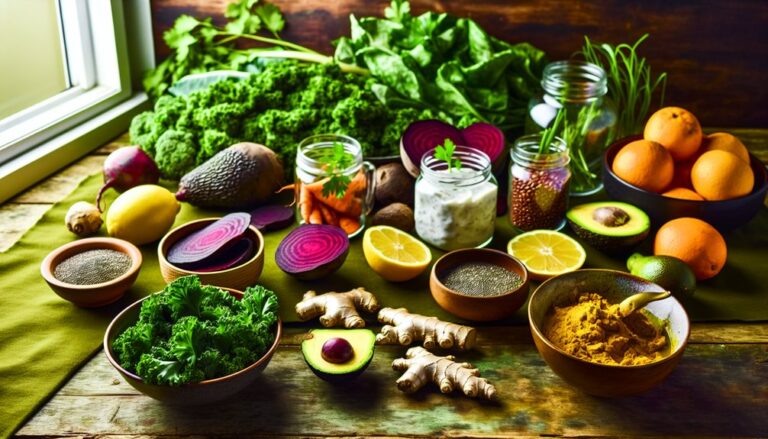

Imagine your liver as a diligent gardener, tirelessly weeding out toxins and nurturing your body with essential nutrients. After a detox, you need to guarantee this gardener has the right tools and environment to thrive, which means adjusting your diet thoughtfully. It’s not just about what you remove; it’s equally significant to take into account what you add to your plate. So, what specific foods can cultivate that healthy landscape for your liver, and what habits might hinder its growth? Let’s explore how to foster that balance.
Key Takeaways
- Focus on a balanced diet rich in leafy greens, healthy fats, and lean proteins to support liver function post-detox.
- Avoid processed sugars, artificial additives, trans fats, and excessive salt to reduce liver strain and prevent fat buildup.
- Ensure proper hydration with water and moisture-rich foods to aid in liver detoxification and overall health.
- Incorporate nutritional supplements like milk thistle and omega-3 fatty acids for additional liver support and regeneration.
- Monitor portion sizes and practice mindful eating to enhance digestion and prevent overeating, promoting liver health.
Importance of Liver Health
The liver is an essential organ that plays a significant role in your overall health and well-being. It’s responsible for detoxification, metabolizing nutrients, and producing bile, which aids digestion.
Understanding liver health is important, especially since liver diseases like fatty liver can arise from poor lifestyle choices.
Many detox myths suggest that you can simply cleanse your liver through trendy diets or quick fixes. In reality, supporting liver function requires consistent care.
High levels of liver enzymes can indicate stress or damage to your liver, making it imperative to adopt a liver-friendly diet rich in antioxidants, healthy fats, and fiber.
Incorporating liver support foods like leafy greens, beets, and walnuts can enhance your liver detoxification processes.

Regular exercise also contributes to improved liver health benefits, helping to maintain a healthy weight and reduce the risk of fatty liver.
Understanding Detoxification
Detoxification is your body’s natural way of removing toxins, and understanding this process is vital for maintaining liver health.
The liver plays a key role in filtering out harmful substances and metabolizing nutrients, which is why supporting its function is essential.
Detoxification Process Explained
Understanding the detoxification process is fundamental for anyone looking to improve their liver health. Your liver plays a critical role in filtering toxins from your body through complex detox pathways. These pathways rely on liver enzymes, which help break down and eliminate harmful substances.
Here’s a breakdown of the detoxification process:
| Phase | Description |
|---|---|
| Phase 1 | Involves transforming toxins into less harmful compounds using liver enzymes. |
| Phase 2 | Conjugation process where the body further processes these compounds, making them easier to excrete. |
| Phase 3 | Elimination of the processed toxins through bile or urine. |
During detoxification, your liver enzymes are vital for managing these phases efficiently. If these enzymes are overworked or depleted, your liver may struggle to detoxify effectively. Understanding how these processes work can empower you to support your liver through a balanced diet and healthy lifestyle choices. By focusing on what you consume post-detox, you can maintain ideal liver function and guarantee your detox pathways remain open and effective.

Importance of Liver Health
A healthy liver is fundamental for overall well-being, as it plays a key role in detoxifying your body from harmful substances. The liver function is critical for maintaining metabolic health, supporting nutrient absorption, and producing bile, which aids in fat metabolism. When your liver is functioning at its best, it efficiently eliminates toxins and regulates liver enzymes that help process nutrients.
Detox benefits go beyond just cleansing; they enhance your liver’s ability to regenerate and recover from damage. This regeneration is essential for sustaining long-term liver support, ensuring that your body can effectively handle the daily influx of toxins from the environment and your diet.
When the liver struggles, you may experience a decline in metabolic health, affecting your energy levels and overall wellness. Prioritizing liver health means focusing on proper nourishment and lifestyle choices that promote toxin elimination.
Incorporating foods rich in antioxidants and healthy fats can support liver enzymes, enhancing its detoxification capabilities. Remember, your liver is resilient but needs your commitment to maintain its health for years to come.
Foods to Include
To support your liver health after detox, focus on incorporating leafy greens, healthy fats, and staying hydrated into your diet.
Leafy greens like spinach and kale are packed with nutrients that help your liver function efficiently.

Additionally, healthy fats from sources like avocados and olive oil can provide essential support for liver repair and overall health.
Leafy Greens Benefits
Including leafy greens in your diet can greatly boost your liver health post-detox. These nutrient-dense foods are packed with vitamins, minerals, and antioxidants that support liver function and detoxification. Kale, spinach, arugula, and Swiss chard are excellent choices, each offering unique health benefits.
You can enjoy leafy greens in various salad varieties, which allow you to mix and match flavors and textures. Experiment with different cooking methods, like sautéing or steaming, to retain their nutrients while adding depth to your meals. Seasonal availability guarantees you get the freshest options, making it easier to incorporate these greens into your daily routine.
Leafy greens also make fantastic smoothie ingredients, blending well with fruits and other vegetables for a nutritious drink. Try flavor combinations like spinach with banana and almond milk, or kale with pineapple and ginger.
These combinations not only taste great but also enhance your body’s detox support.
Healthy Fats Sources
Incorporating healthy fats into your diet is just as important for maintaining liver health after detox. Healthy fats support your liver’s ability to process nutrients and eliminate toxins. Here are some excellent sources you should consider including in your meals:

| Healthy Fats | Benefits |
|---|---|
| Avocados | Packed with healthy monounsaturated fats to reduce inflammation. |
| Fatty Fish | Rich in omega-3 sources that support liver function and reduce fat accumulation. |
| Olive Oil | Contains antioxidants and healthy fats that promote liver health. |
Other great options include nut varieties like almonds and walnuts, which also offer numerous health benefits. Coconut products provide medium-chain triglycerides, beneficial for energy. Flaxseeds and chia seeds are excellent for their omega-3 content and fiber, contributing to overall digestive health. Don’t forget about hemp oil, known for its anti-inflammatory properties. Finally, when choosing meat, opt for grass-fed options to guarantee you’re getting healthier fat profiles. By incorporating these healthy fats, you’ll support your liver’s recovery and maintain its health moving forward.
Hydration Importance
While many people underestimate the importance of hydration for liver health, staying properly hydrated is essential for your body’s detoxification processes.
Water helps flush out toxins, maintains electrolyte balance, and supports overall liver function.
Here are some hydration tips to take into account:
- Drink water regularly: Aim for a consistent hydration frequency throughout the day.
- Incorporate herbal teas: They’re not only hydrating but can also offer additional health benefits.
- Choose water-rich foods: Foods like cucumbers, watermelon, and oranges serve as excellent water sources.
- Watch for hydration signs: Dry skin, fatigue, or dark urine can indicate you need more fluids.
- Debunk hydration myths: Don’t rely solely on thirst; your body may need water before you feel thirsty.
Foods to Avoid
To maintain ideal liver health after a detox, it’s crucial to be mindful of what you eat. Certain foods can hinder your liver’s recovery and overall function.
First, steer clear of processed sugars. These can lead to fat buildup in the liver, increasing the risk of fatty liver disease. Similarly, artificial additives found in many packaged foods often contribute to inflammation and toxicity.

Trans fats, commonly present in fried and commercially baked goods, are another no-go. They’ve been linked to liver damage and should be avoided at all costs.
You’ll also want to limit your intake of excessive alcohol. While moderate consumption may be acceptable for some, too much alcohol can severely impair liver function and lead to long-term damage.
Lastly, high sodium levels can cause fluid retention and increase blood pressure, straining your liver. Instead of reaching for salty snacks or processed foods, aim for fresh, whole ingredients.
Hydration and the Liver
Staying hydrated is vital for your liver’s health and overall function. Proper water intake supports liver function by helping to flush out toxins and maintain electrolyte balance.
Many hydration myths suggest you only need eight glasses a day, but individual needs vary based on activity levels, climate, and diet.
Here are some hydration tips to keep in mind:

- Drink water consistently throughout the day to guarantee hydration frequency.
- Incorporate moisture-rich foods, like cucumbers and watermelon, into your diet.
- Try herbal infusions or detox beverages for variety and added benefits.
- Pay attention to your body’s signals; thirst is a sign to hydrate.
- Balance your electrolytes by consuming foods like bananas and avocados.
These practices lead to ideal hydration, which is essential for your liver’s detoxification processes.
Remember, the liver works harder during detox periods, making it even more important to stay hydrated.
Portion Control Strategies
When it comes to maintaining liver health, practicing mindful eating can make a significant difference.
By focusing on a balanced plate approach, you can guarantee you’re nourishing your body without overloading it.
These portion control strategies not only support liver function but also promote overall well-being.
Mindful Eating Practices
Mindful eating practices, especially those focused on portion control, can greatly contribute to maintaining your liver health after detox. By developing portion awareness, you can cultivate a healthier relationship with food, which aids digestion and supports liver function.

Incorporating strategies like intuitive eating helps you listen to your body’s cues, allowing you to eat in moderation.
Here are some effective mindful eating practices to embrace:
- Slow eating: Take your time to savor each bite, enhancing your enjoyment and reducing the risk of overeating.
- Food journaling: Keep track of what you eat, which helps you become more aware of portion sizes and nutritional choices.
- Flavor appreciation: Focus on the taste and texture of your food, making meals more satisfying and preventing mindless consumption.
- Mindful cooking: Prepare meals with intention, incorporating fresh ingredients that support liver health.
- Gratitude practice: Reflect on the nourishment your food provides, fostering a positive relationship with what you eat.
Balanced Plate Approach
After adopting mindful eating practices, incorporating the Balanced Plate Approach can further enhance your liver health by promoting portion control and nutritional balance.
This strategy emphasizes creating a balanced meal that includes a variety of food groups, ensuring nutrient density in every bite. Aim to fill half your plate with colorful vegetables, a quarter with lean proteins, and the remaining quarter with whole grains.
Portion balance is key; it helps prevent overeating while allowing for food variety. You can also experiment with meal timing to optimize digestion and energy levels, eating smaller meals more frequently throughout the day.
Don’t hesitate to make ingredient swaps to boost flavor and nutrition—try quinoa instead of rice or swap out sour cream for Greek yogurt.

Enhance your dishes with herbs and spices, fostering culinary creativity without extra calories.
Consider dietary adjustments based on your personal preferences and lifestyle, ensuring your meals remain enjoyable.
Remember, thoughtful food preparation can contribute to overall liver health, making every meal a delicious opportunity to support your well-being.
Nutritional Supplements
Nutritional supplements can play an important role in supporting liver health, especially following a detox process.
After detox, your liver may benefit from various supplement types that help it recover and function at its best. It’s vital to follow appropriate dosage guidelines to guarantee you’re getting the most benefit without overdoing it.
Here are some key supplements to reflect on:

- Milk Thistle: Known for its active ingredient, silymarin, it supports liver regeneration. Recommended dosage is typically 150-300 mg daily.
- N-Acetyl Cysteine (NAC): It boosts glutathione levels, an important antioxidant for liver health. A common dosage is around 600-1200 mg daily.
- Turmeric: Contains curcumin, which has anti-inflammatory properties. Aim for 500-2000 mg daily.
- Omega-3 Fatty Acids: These can help reduce liver fat. A daily dosage of 1000-3000 mg is often recommended.
- Vitamin E: Acts as an antioxidant that can support liver function. Dosage guidelines suggest 400-800 IU daily.
Before starting any supplement, you should consult with a healthcare professional to tailor it to your specific needs.
Meal Planning Tips
When planning meals to support liver health post-detox, focus on incorporating a variety of nutrient-dense foods that promote liver function and overall well-being. Effective meal prep is essential for making healthy choices easier throughout the week. Here are some tips to help you get started:
- Plan Ahead: Dedicate time each week to plan meals. This helps you stay organized and minimize impulse eating.
- Balance Your Plate: Aim for a mix of lean proteins, whole grains, healthy fats, and plenty of fruits and vegetables.
- Mind Your Portions: Using appropriate portion sizes helps prevent overeating and guarantees you get a balanced intake of nutrients.
Here’s a simple meal planning guide:
| Food Group | Example Food |
|---|---|
| Lean Proteins | Chicken, Tofu |
| Whole Grains | Quinoa, Brown Rice |
| Healthy Fats | Avocado, Olive Oil |
Lifestyle Changes for Success
Making lifestyle changes can greatly enhance your liver health and overall well-being. By incorporating effective lifestyle modifications, you can create a supportive environment for your liver to thrive. Here are some practical steps you can take:
- Prioritize stress management: Engage in activities like yoga or meditation to reduce stress levels, which can adversely affect liver health.
- Establish exercise routines: Aim for at least 150 minutes of moderate exercise each week. Regular physical activity helps maintain a healthy weight and promotes liver function.
- Practice good sleep hygiene: Confirm you’re getting quality sleep each night. Poor sleep can lead to increased stress and negatively impact your liver.
- Adopt mindful cooking methods: Choose healthier cooking techniques such as steaming, grilling, or baking to reduce unhealthy fats in your diet.
- Be aware of portion sizes: Understanding portion awareness can prevent overeating and support a balanced diet, essential for liver health.
Additionally, don’t underestimate the power of social support. Surrounding yourself with friends or family who share your health goals can boost your motivation and accountability.
Monitoring Your Progress
To effectively maintain your liver health after detox, it’s important to monitor your progress regularly. Start with progress tracking by setting clear health benchmarks to evaluate your improvements. This can include regular check-ups with your healthcare provider to assess liver function through blood tests.

Incorporate symptom monitoring into your routine to identify any changes in your health. Keep an eye out for signs like fatigue, digestive issues, or skin changes, as these may indicate the need for lifestyle adjustments.
Dietary reflections are significant; note how different foods affect your well-being in a wellness journal. This practice helps you recognize patterns and make informed choices that support liver health.
Goal setting is another key aspect. Create specific, measurable objectives for your diet and lifestyle, and revisit them regularly to verify you’re on track.
Establish feedback loops by discussing your progress with a friend or health professional. This can provide motivation and accountability, making it easier to stick to your commitments.
Conclusion
Incorporating these dietary adjustments post-detox can greatly enhance your liver health. By choosing nutrient-dense foods, staying hydrated, and avoiding harmful substances, you’re not just supporting your liver; you’re also fostering overall well-being. Remember, small changes lead to big results. Monitor your progress, stay mindful, and embrace lifestyle shifts that resonate with you. With each meal, you’re nurturing your body and empowering your liver to thrive, ensuring it remains resilient in managing toxins and metabolism effectively.







